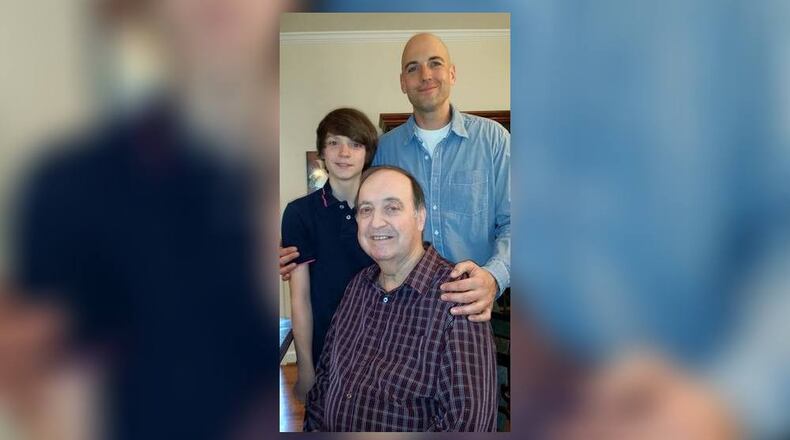The family of a 40-year-old man who committed suicide in Fulton County jail wants to know why his heroin addiction and mental illness went untreated while in custody.
“He was stuck in limbo without anything to help him,” said Julie Jones, whose older brother, Shannon Thompson, died Aug. 12.
Thompson had struggled with depression in recent years and tried to kill himself in June while living in Cumming. Police negotiators told his family, “He didn’t need to be in jail; he needed help,” Jones said.
But he was subsequently arrested twice.
On Aug. 3, Thompson was arrested on charges of DUI drugs, possession of drug-related objects and possession of less than 1 ounce of marijuana. His father, Larry Thompson, paid his bond, but he was arrested again in Fulton County on Aug. 8 and charged with possession of heroin, cocaine and marijuana. Four days after that, he was found dead in his cell.
His family wants to know why he wasn’t on suicide watch, considering his struggles with depression.
Following his suicide attempt in June, Thompson was prescribed Suboxone, commonly used in the treatment of opioid dependence, Jones told The Atlanta Journal-Constitution.
“I don’t know why he wasn’t under a special watch to detox – that’s beyond me,” Jones said. “I know for a fact there’s no way he could have been in his right state of mind.”
Shannon’s cellmate reported the suicide to jail officials, Fulton County jail spokeswoman Tracy Flanagan said.
“At risk inmates are checked on frequently,” Flanagan said. “The investigation is ongoing.”
According to a jail incident report, Thompson’s cellmate, Tyler Taylor, fell asleep about noon and woke up just before 3 p.m. when he noticed Thompson was not breathing. He immediately started pressing the panic button and banging on the cell bars for help.
Jail records state a detention officer checked the area between 2:21 and 2:23 p.m., walking to the far wall and up the stairs to the top mezzanine. It’s unclear whether they checked individual cells.
Within minutes of Tyler’s call for help, officers and medical personnel responded, the report states. First responders continued CPR efforts as Thompson was transported to Grady Memorial Hospital, where he was pronounced dead.
Thompson’s friends remembered him as caring and intelligent. But his drug addiction, and the related legal troubles, left him frustrated and unable to move forward with his life, they said.
Jake Payne, a close friend since childhood, said Thompson had a heart for those who couldn’t protect themselves.
“He came from a good and large family that loved him dearly,” Payne said. “I can't remember the last time I saw him, but, I know when I bumped into him coming home on leave from the Navy, I didn't get a handshake, I got a bear hug.”
Thompson’s life took a serious detour at age 30, when he was sentenced to spend eight years in prison. When he was released at age 38, Thompson was still battling his drug dependency and had few marketable employment skills — along with a criminal record. But Jones said he stayed sober for a while and took every job he was offered.
Somewhere in the last two years, though, his mental health deteriorated.
“He was trying to do better, but he got frustrated and depressed and the good things weren’t going at as fast a pace as the world around him,” Jones said.
Thompson had lost hope, stigmatized, he believed, by a society that criminalizes addiction, said longtime friend Jason Earley.
“At 40, were I faced with the prospect of being robbed of the next 10 to 20 years of my life for no other reason than illness, I would have exercised the only freedom I had left just the same as my childhood companion,” Earley said.
Though he made mistakes, Earley said Thompson was a Christian and had been forgiven by God.
“My friend was not a criminal,” he said.
Former girlfriend Julianne Milum dated Thompson for a few years before he went to prison. He treated her 4-year-old daughter like she was his own, Milium recalled, teaching her to swim and helping her get ready for kindergarten. Though the relationship didn’t last, Milum and Thompson remained friends.
“I will never remember Shannon for his downfalls, only his striving towards being a better person and conquering addiction and for the love that poured out of him for all,” Milum said. “Drugs took his life, he did not.”
Know what's really going on with crime and public safety in your metro Atlanta community, including breaking news, trial coverage, trends and the latest on unsolved cases. Sign up for the AJC's crime and safety newsletter delivered weekly to your inbox.
In other news:
About the Author
Keep Reading
The Latest
Featured




